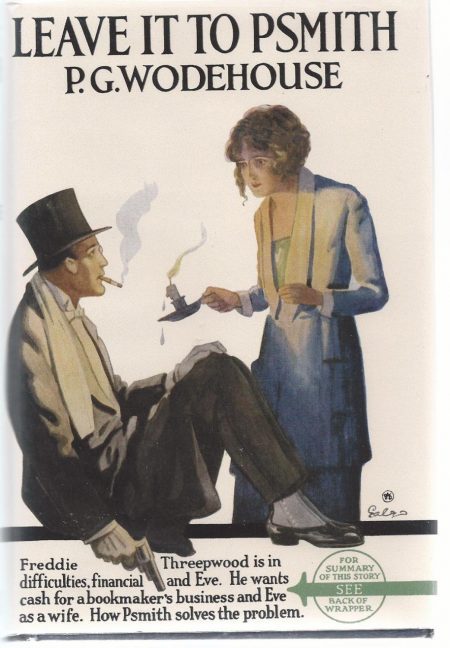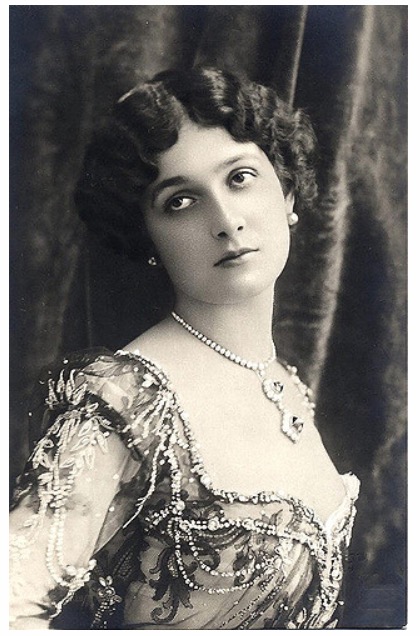LEAVE IT TO PSMITH (5)
By:
January 29, 2019

Leave It to Psmith (1923) is the last and most rewarding of four novels featuring the dandy, wit, and would-be adventurer Ronald Eustace Psmith, one of P.G. Wodehouse‘s most popular characters. (“One can date exactly,” Evelyn Waugh claimed, in reference to Psmith’s debut in the 1909 novel Mike, “the first moment when Wodehouse was touched by the sacred flame.”) Leave It to Psmith‘s copyright enters the public domain in 2019; HiLoBooks is pleased to serialize this terrific book here at HILOBROW. Enjoy!

Mr Keeble regarded his nephew with unconcealed astonishment. He had been prepared for imbecility, but this exceeded his expectations.
‘Steal my wife’s necklace!’
‘That’s it. Frightfully quick you are, getting on to an idea. Pinch Aunt Connie’s necklace. For, mark you,’ continued Freddie, so far forgetting the respect due from a nephew as to tap his uncle sharply on the chest, ‘if a husband pinches anything from a wife, it isn’t stealing. That’s law. I found that out from a movie I saw in town.’
The Hon. Freddie was a great student of the movies. He could tell a super-film from a super-super-film at a glance, and what he did not know about erring wives and licentious clubmen could have been written in a sub-title.
‘Are you insane?’ growled Mr Keeble.
‘It wouldn’t be hard for you to get hold of it. And once you’d got it everybody would be happy, I mean, all you’d have to do would be to draw a cheque to pay for another one for Aunt Connie — which would make her perfectly chirpy, as well as putting you one up, if you follow me. Then you would have the other necklace, the pinched one, to play about with. See what I mean? You could sell it privily and by stealth, ship Phyllis her three thousand, push across my thousand, and what was left over would be a nice little private account for you to tuck away somewhere where Aunt Connie wouldn’t know anything about it. And a dashed useful thing,’ said Freddie, ‘to have up your sleeve in case of emergencies.’
‘Are you…” Mr Keeble was on the point of repeating his previous remark when suddenly there came the realization that, despite all preconceived opinions, the young man was anything but insane. The scheme, at which he had been prepared to scoff, was so brilliant, yet simple, that it seemed almost incredible that its sponsor could have worked it out for himself.
‘Not my own,’ said Freddie modestly, as if in answer to the thought. ‘Saw much the same thing in a movie once. Only there the fellow, if I remember, wanted to do down an insurance company, and it wasn’t a necklace that: he pinched but bonds. Still, the principle’s the same. Well, how do we go, Uncle Joe? How about it? Is that worth a thousand quid or not?’
Even though he had seen in person to the closing of the door and the window, Mr Keeble could not refrain from a conspirator-like glance about him. They had been speaking with lowered voices, but now words came from him in an almost inaudible whisper.
‘Could it really be done? Is it feasible?’
‘Feasible? Why, dash it, what the dickens is there to stop you? You could do it m a second. And the beauty of the whole thing is that, if you were copped, nobody could say a word, because husband pinching from wife isn’t stealing. Law.’
The statement that in the circumstances indicated nobody could say a word seemed to Mr Keeble so at variance with the facts that he was compelled to challenge it.
‘Your aunt would have a good deal to say,’ he observed ruefully.
‘Eh? Oh, yes, I see what you mean. Well, you would have to risk that. After all, the chances would be dead against her finding out,’
‘But she might.’
‘Oh, well, if you put it like that, I suppose she might.’
‘Freddie, my boy,’ said Mr. Keeble weakly, ‘I daren’t do it!’
The vision of his thousand pounds slipping from his grasp so wrought upon Freddie that he expressed himself in a manner far from fitting in one of his years towards an older man,
‘Oh, I say, don’t be such a rabbit!’
Mr Keeble shook his head.
‘No,’ he repeated, ‘I daren’t.’
It might have seemed that the negotiations had reached a deadlock, but Freddie, with a thousand pounds in sight, was in far too stimulated a condition to permit so tame an ending to such a promising plot. As he stood there, chafing at his uncle’s pusillanimity, an idea was vouchsafed to him.
‘By Jove! I’ll tell you what!’ he cried.
‘Not so loud!’ moaned the apprehensive Mr Keeble. ‘Not so loud!’
‘I’ll tell you what,’ repeated Freddie in a hoarse whisper. ‘How would it be if I did the pinching?’
‘What!’
‘How would it…’
‘Would you?’ Hope, which had vanished from Mr Keeble’s face, came flooding back. ‘My boy, would you really?’
‘For a thousand quid you bet I would.’
Mr Keeble clutched at his young relative’s hand and gripped it feverishly.
‘Freddie,’ he said, ‘the moment you place that necklace in my hands, I will give you not a thousand but two thousand pounds.’
‘Uncle Joe,’ said Freddie with equal intensity, ‘it’s a bet!’
Mr Keeble mopped at his forehead.
‘You think you can manage it?’
‘Manage it?’ Freddie laughed a light laugh. ‘Just watch me!’
Mr Keeble grasped his hand again with the utmost warmth.
‘I must go out and get some air,’ he said. ‘I’m all upset. May I really leave this matter to you, Freddie?’
‘Rather!’
‘Good! Then to-night I will write to Phyllis and say that I may be able to do what she wishes.’
‘Don’t say “may”,’ cried Freddie buoyantly. ‘The word is “will.” Bally will! What ho!’
SERIALIZED BY HILOBOOKS: Jack London’s The Scarlet Plague | Rudyard Kipling’s With the Night Mail (and “As Easy as A.B.C.”) | Arthur Conan Doyle’s The Poison Belt | H. Rider Haggard’s When the World Shook | Edward Shanks’ The People of the Ruins | William Hope Hodgson’s The Night Land | J.D. Beresford’s Goslings | E.V. Odle’s The Clockwork Man | Cicely Hamilton’s Theodore Savage | Muriel Jaeger’s The Man With Six Senses | Jack London’s “The Red One” | Philip Francis Nowlan’s Armageddon 2419 A.D. | Homer Eon Flint’s The Devolutionist | W.E.B. DuBois’s “The Comet” | Edgar Rice Burroughs’s The Moon Men | Charlotte Perkins Gilman’s Herland | Sax Rohmer’s “The Zayat Kiss” | Eimar O’Duffy’s King Goshawk and the Birds | Frances Hodgson Burnett’s The Lost Prince | Morley Roberts’s The Fugitives | Helen MacInnes’s The Unconquerable | Geoffrey Household’s Watcher in the Shadows | William Haggard’s The High Wire | Hammond Innes’s Air Bridge | James Branch Cabell’s Jurgen | John Buchan’s “No Man’s Land” | John Russell’s “The Fourth Man” | E.M. Forster’s “The Machine Stops” | John Buchan’s Huntingtower | Arthur Conan Doyle’s When the World Screamed | Victor Bridges’ A Rogue By Compulsion | Jack London’s The Iron Heel | H. De Vere Stacpoole’s The Man Who Lost Himself | P.G. Wodehouse’s Leave It to Psmith | Richard Connell’s “The Most Dangerous Game” | Houdini and Lovecraft’s “Imprisoned with the Pharaohs” | Arthur Conan Doyle’s “The Sussex Vampire.”
RADIUM AGE SCIENCE FICTION: “Radium Age” is HILOBROW’s name for the 1904–33 era, which saw the discovery of radioactivity, the revelation that matter itself is constantly in movement — a fitting metaphor for the first decades of the 20th century, during which old scientific, religious, political, and social certainties were shattered. This era also saw the publication of genre-shattering writing by Edgar Rice Burroughs, Sax Rohmer, E.E. “Doc” Smith, Jack London, Arthur Conan Doyle, Aldous Huxley, Olaf Stapledon, Karel Čapek, H.P. Lovecraft, Charlotte Perkins Gilman, Yevgeny Zamyatin, Philip Gordon Wylie, and other pioneers of post-Verne/Wells, pre-Golden Age “science fiction.” More info here.
READ GORGEOUS PAPERBACKS: HiLoBooks has reissued the following 10 obscure but amazing Radium Age science fiction novels in beautiful print editions: Jack London’s The Scarlet Plague, Rudyard Kipling’s With the Night Mail (and “As Easy as A.B.C.”), Arthur Conan Doyle’s The Poison Belt, H. Rider Haggard’s When the World Shook, Edward Shanks’ The People of the Ruins, William Hope Hodgson’s The Night Land, J.D. Beresford’s Goslings, E.V. Odle’s The Clockwork Man, Cicely Hamilton’s Theodore Savage, and Muriel Jaeger’s The Man with Six Senses. For more information, visit the HiLoBooks homepage.
